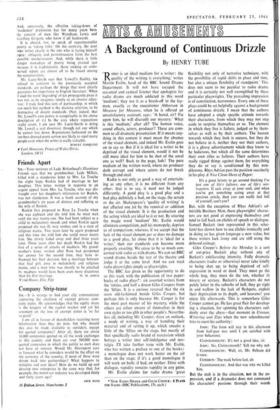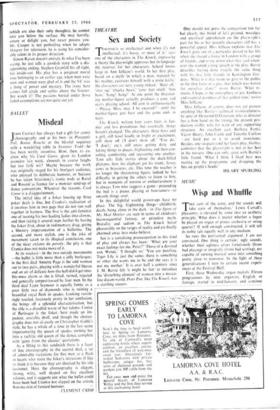61, LAY UV U"2
A Background of Continuous Drizzle
By HENRY TUBE
‘-r) ADIO is an ideal medium for a writer: the Jrk quality of the writing is everything,' writes Martin Esslin, head of the BBC Sound Drama Department. It will not have escaped the seasoned and cynical listener that apologists for radio drama are much addicted to this word `medium'; they use it as a brush-off to the lay- man, exactly as the executioner Abhorson in Measure for Measure, when he is offered an unsatisfactory assistant, says : 'A bawd, sir? Fie upon him, he will discredit our mystery.' What is this 'medium,' after all? The human voice, sound effects, actors, producer? These are com- mon to all dramatic presentation. If it means any- thing in this context it must mean the absence of the visual element, and indeed Mr. Esslin goes on to say so. But if it is ideal for a writer to be deprived of the visual element, would it not be still more ideal for him to be shot of the aural one as well? Back to the page, lads! The pure medium of the written word, where no producer doth corrupt and where actors do not break through and steal.
Radio is not only as good a way of entertain- ing as any other, it is no different from any other; that is to say, it need not be judged differently. A good play is a good play and a bad play definitely a bad, on the stage, the screen or the air. Shakespeare's 'quality of writing' is not affected one jot by the removal or addition of the visual element.' It is the production and the acting which are ideal to it or not. By uttering the magic word 'medium' Mr. Esslin would eliminate competition, pull his monopoly, deprive us of comparison; whereas, if we accept that the lack of the visual element per se does no damage to a good play, let alone that it is 'ideal for a writer,' then our standards can become more properly exacting. We cease to be so much con- cerned with radio as with drama. We can set BBC sound drama beside the rest of the theatre and judge it at the same level. And we can treat radio playwrights simply as playwrights.
The BBC has given us the opportunity to do so this week with the publication of two paper- backs of radio plays*: six assorted writers from the 'sixties, and half a dozen Giles Coopers from the 'fifties. It is a curious reversal that the six seem old-fashioned beside Giles Cooper, but perhaps this is only because Mr. Cooper is for the most part master of his mystery, while the others are either unsure of themselves in their own styles or too glib in other people's. Neverthe- less all, including Mr. Cooper, share an outlook, a mode of writing, a way of handling their material and of setting it up, which smacks a little of the 'fifties on the stage, but mostly of that specifically radio brand of narcissism which betrays a writer into self-indulgence and nos- talgia. I'll take further issue with Mr. Esslin, who has written a preface to one of the books : a monologue does not work better on the air than on the stage; if it's a good monologue it will work on both; if bad, on neither. Ditto with dialogue, vapidity remains vapidity in any guise.
Mr. Esslin claims for radio drama 'great • NEW RADIO DRAMA and GILES COOPER: 6 PLAYS flexibility not only of narrative technique, with the possibility of rapid shifts in place and time, but also a unique flexibility of standpoint.' This does not seem to me peculiar to radio drama and it is certainly not well exemplified by these particular playwrights. The prevailing impression is of constriction, narrowness. Every one of these plays could be set helpfully against a background of continuous drizzle. I mean that the authors have adopted a single specific attitude towards their characters, from which they may not step aside to surprise themselves or us. The element in which they live is failure, judged so by them- selves as well as by their authors. The heaven towards which they look is success, but they do not believe in it, neither they nor their authors, it is a glossy advertisement which they know to be ludicrous, but which all the same determines their own roles as failures. Their authors have really rigged things against them, for everything they do or say is conditioned by this non- dilemma. Rhys Adrian puts the position succinctly in his play A Nice Clean Sheet of Paper: It's a great luxury to go around thinking fin just one of life's failures, one of life's mis- begotten. It eats away at your soul, and when you've got something eating away at that precious article, then you can really feel full of yourself, can't you?
But, with the exception of Rhys Adrian's ad- mirable Business Man, these playwrights' charac- ters are not good at expressing themselves and tend to fall back on clichés of speech or dialogue. Samuel Beckett (not represented in this selec- tion) has shown how to use clichés ironically and in doing so has given language a new value, but these writers lack irony and are still using the debased coinage.
Giles Cooper's Before the Monday is a sort of cut-price Beckett play without any of Beckett's exhilarating intensity. Fully dramatic characters (radio or otherwise) never take kindly to being shut up, to being deprived of self- expression in word or deed. They must go the whole hog, they must do the ton, whether in misery or ecstasy. Beckett's characters do not palely loiter in the suburbs of hell, they go right in and wallow in the lack of fleshpots, exploit their deprivation to its depth, and heavens! you enjoy life afterwards. This is somewhere Giles Cooper cannot go. He has great flair for develop- ing a situation, for spinning his characters sud- denly over the abyss—that moment in Unman, Wittering and Zigo when the new schoolmaster tries to exert his authority : JoHN: The form will stay in this afternoon from half-past two until I am satisfied with your behaviour.
CLOISTERMOUTH: It's not a good idea, sir. lows': No, Cloistcrmouth? Tell me why not. CLOISTERMOUTH: Well, sir, Mr. Pelham did it once.
CUTHBUN: The week before last, sir. CloisTERmourx: And that was why we killed
him.
But the stab is in the situation, not in the ex- pression, and if a dramatist does not command his characters' passions through their words
(which are also their only thoughts), he cannot take you below the surface. He may horrify, amaze or delight you, but never possess you. Mr. Cooper is not potboiling when he adapts Maigret for television, he is using his consider- able talent in its proper direction.
Simon Raven doesn't entirely fit what I've been saying, he just tells a goodish story with a dis- appointing ending. Stephen Grenfell fits all right, but inside-out. His play has a poignant moral tone beldnging to an earlier age, when men were men and women were glad of it and the VC was a thing of power and mystery. The irony here comes full circle and settles about the listener. But watch it! The passions buried under those faded assumptions are not quite out yet.



































 Previous page
Previous page